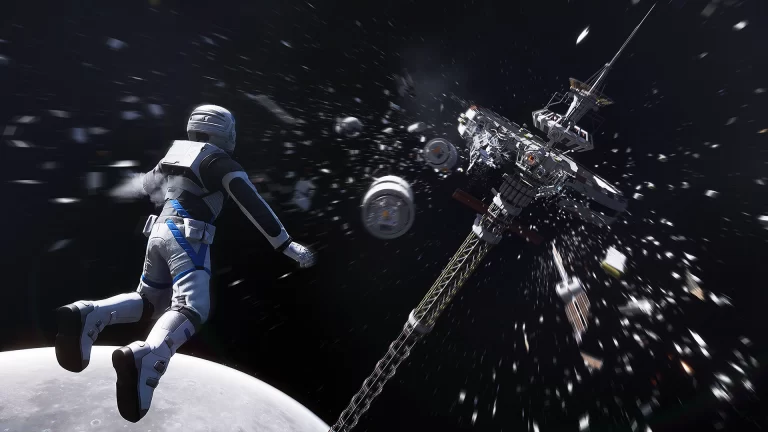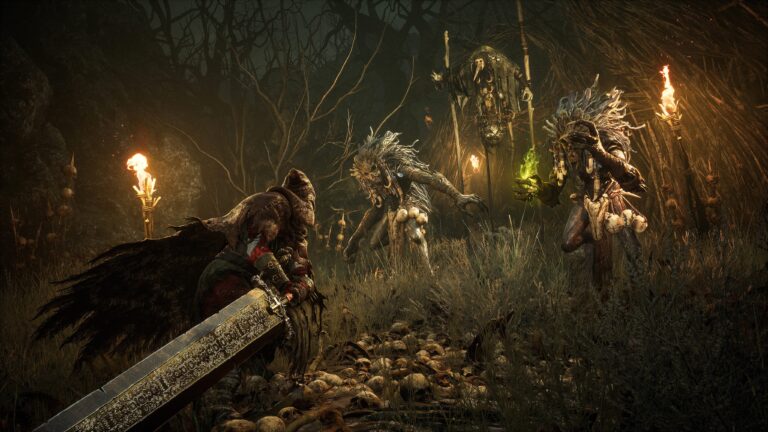Fans of Magic: The Gathering received a pre-holiday surprise at The Game Awards this year—a short cinematic trailer revealing Magic: Legends, an upcoming MMO ARPG based on the collectible card game.
This isn’t the first time that Wizards of the Coast has made a foray into the world of video gaming, as Magic has spawned a handful of titles throughout its existence. It is, however, the first time for something of this scope—for a multiplayer experience wherein other Planeswalkers are friends, not foes, and where there’s nary a card in sight.
The idea is ambitious, so much so that it leaves long-time fans of the collectible card game curious, wondering how one would go about transforming a tabletop card game into an MMO. The concept seems brilliant on the surface. An enterprising way to draw gamers who don’t enjoy CCGs into the Magic: The Gathering universe. Yet a look below those calm, placid waters reveals some murkiness and turbid currents developers must navigate if Magic: Legends is to succeed.
https://www.youtube.com/watch?v=32MSls8IFT0
A Phenom Even in Infancy
Magic: The Gathering burst into the nerd scene in 1993, a year before the original PlayStation. The first collectible card game, Magic appealed in many ways to pen-and-paper gamers, in particular those who enjoyed high fantasy and Dungeons & Dragons. While the gameplay was different in its entirety from rolling dice and describing actions, it still allowed its players to step into the shoes of a mighty wizard—or Planeswalker, in the Magic universe. Through collecting cards and employing custom decks, Magic fans had a direct impact on their own game experience, yet were still subject to a luck factor through card hands and random draws.
The game took off like a centaur slapped with a branding iron, responsible in almost every way for the trading card game phenomenon that gripped the 90s and early 2000s. In the ensuing 26 years since its original launch, over 70 million people have played Magic: The Gathering. A juggernaut that seems as if it will never stop, the game increased in popularity from 2008 until 2016, with over 20 billion Magic cards printed during that time period alone.
With Magic’s popularity soaring to the clouds and beyond since its inception, a person who didn’t know much about the franchise’s history might wonder why it hasn’t yet made its way into the realm of gaming. However, Magic has been translated into several video game titles, most of which play similar to—or exactly like—the card game.
Previous Video Games Are a Mixed Bag
1997 saw the release of three separate video games based on the Magic franchise. The first of these was MicroProse’s Magic: The Gathering, which had some adventure and RPG elements, but in which combat still relied on the use of a card deck. The second—Acclaim’s Magic: The Gathering: BattleMage—was a real-time strategy title, released for the PlayStation and PC chock full of faulty, overpowered AI, game-breaking bugs, an inauspicious interface, and general lack of redeeming factors.
Magic: The Gathering: Armageddon was another Acclaim game released in 1997—an arcade game, to be exact. It’s estimated that as few as four machines were ever created, as the company who made the machines went out of business shortly after their manufacture. In 2001, Sega published a Dreamcast game entitled Magic: The Gathering, which was exclusive to Japan and again featured card gameplay as its main mechanic.
Other games have followed, including Magic: The Gathering Online, and Magic: The Gathering Arena, both of which are, at their core, a way for gamers to enjoy the original card game in a digital format, much in the same way as Blizzard Entertainment’s Hearthstone. Of particular note, the Magic: The Gathering – Duels of the Planeswalker series received much praise at its inception and through its first four iterations. Criticized for restrictive gameplay, its 2015 version seemed locked behind a never-ending series of microtransactions—appearing to many fans as a blatant cash-grab trying to capitalize on franchise loyalty.
It’s important to note that none of the aforementioned titles that met with any success strayed far from the original concept of card gameplay. Even games which incorporated RPG elements consisted of moving throughout a gameworld and battling one’s enemies with cards. A moment of contemplation reveals the obvious reason for this design choice: creating video game mechanics that behave in the same manner as collectible cards is a daunting, if not impossible task.
Translating Gameplay from Cards to MMO
Two immediate issues spring to mind when it comes to the metamorphosis of Magic: The Gathering from card game into MMORPG. Chief among these problems is the randomness inherent in card games. Every Magic player knows the frustration of a loss suffered due to a bad draw, regardless of mulligan. No MMO player is unfamiliar with the annoyance of grinding for a particular item—only to have the random number generator decide that instead, they need their fortieth copy of the same ring.
Few details are yet known regarding the gameplay in Magic: Legends. The developers doled out a few little drops of knowledge on the game’s Discord channel, one of which revealed that combat occurs in real-time, and that players must “strategically choose the spells in [their] hand because they’ll be drawn at random” during battle. A further statement states fans can “discover a myriad of spells and collect spell fragments to make them more powerful.” From this, one can extrapolate that combat will not involve battling enemies with card decks, but rather occurs in the traditional RPG manner of flinging magic around with one’s hands.
The randomness factor, however, seems more problematic than anything else—a unique twist, yes, but frustration due to a sense of helplessness on the player’s part does not make them want to continue playing a game. Discovering the best strategy to defeat any given encounter is something the vast majority of MMO fans enjoy. Having the wrong spell go off at the absolute worst time in a manner completely out of the player’s control will only serve to induce rage and cause them to shut the game off and never pick it up again.
The other main issue inherent in translating a card game to an MMO can be summed up in one word: classes. According to the minute amount of information released so far, Magic: Legends features five classes, and one could surmise that these classes correspond with the five colors of magic in the card game. However, the Discord information also reads “become a powerful, spell-wielding Planeswalker in Magic: Legends,” insinuating that all player characters are spellcasters.
Class identity is important in MMORPGs, as variety keeps fans interested, encouraging them to try new things, which causes them to play for longer periods of time. While the five schools of magic each offer flavor and some individualism, Magic: Legends will allow gamers to switch between them at will, and in the ultimate end, five wizards are five wizards, no matter what kind of magic they’re using.
Two Promising Lights in the Murky Depths
Questions about gameplay aside, Magic: Legends does have potential in two areas of particular note, the first of which is setting. Over twenty-six years, the card game alone generated at least sixty expansions. Each card features gorgeous artwork, showcasing the talent of the artist and the universe of Magic alike. There exists thousands of examples of ‘concept art’ in these cards, providing more than ample amounts of inspiration for the creation of Magic: Legends and its creatures, landscapes, and heroes of note.
As important as a game’s setting is the story presented within, and again the vast amount of expansions to the original card game present developers with enough lore to fill an entire library. While the first few card sets of Magic: The Gathering had no overarching story connecting them together, that changed with the launch of the Ice Age block and Homelands—released in October, 1995.
Homelands was the first Magic expansion manifested with a story in mind prior to the creation of the actual cards. Through flavor text and artwork, Homelands detailed the struggle between the Planeswalker Serra and the vampire lord Baron Sengir. While the set itself garnered criticism for its lack of strong cards or new mechanic keywords, the story it told was unique and even spawned its own licensed comic book featuring Serra and Sengir’s tale.
Each subsequent Magic expansion built on the overall lore of the universe, resulting in such an abundance of available research material that any lack in environment or story is inexcusable on the part of developers.
Developers Must Exercise Caution to Succeed
There’s no question that the Magic: The Gathering universe has enough material upon which a development team can build an MMORPG. However, it’s important to keep in mind that previous titles which deviated from the card game format earned themselves a lukewarm reception at best, and were catastrophic failures at worst.
A beautiful, lore-rich world can take a game far, but if it’s lacking in the mechanics department or riddled with random number generator foolishness, players will balk at the idea of engaging with it. Unpredictability in loot drops is standard, and players have come to expect it as part of the game experience. Randomness affecting combat, however, is a can of worms most gamers would prefer not to find spilled all over MMOs.
Magic: Legends has great potential, but developers may wish to rethink the idea of random ability selection during combat. The game is still in its infancy, with more details to come in January—so there’s plenty of time for its creators to reconsider walking down such a treacherous path. If they do so, and manage to avoid the rest of the slippery stones and random pitfalls ahead, Magic: Legends may become the next big thing in MMOs.
No related posts.









